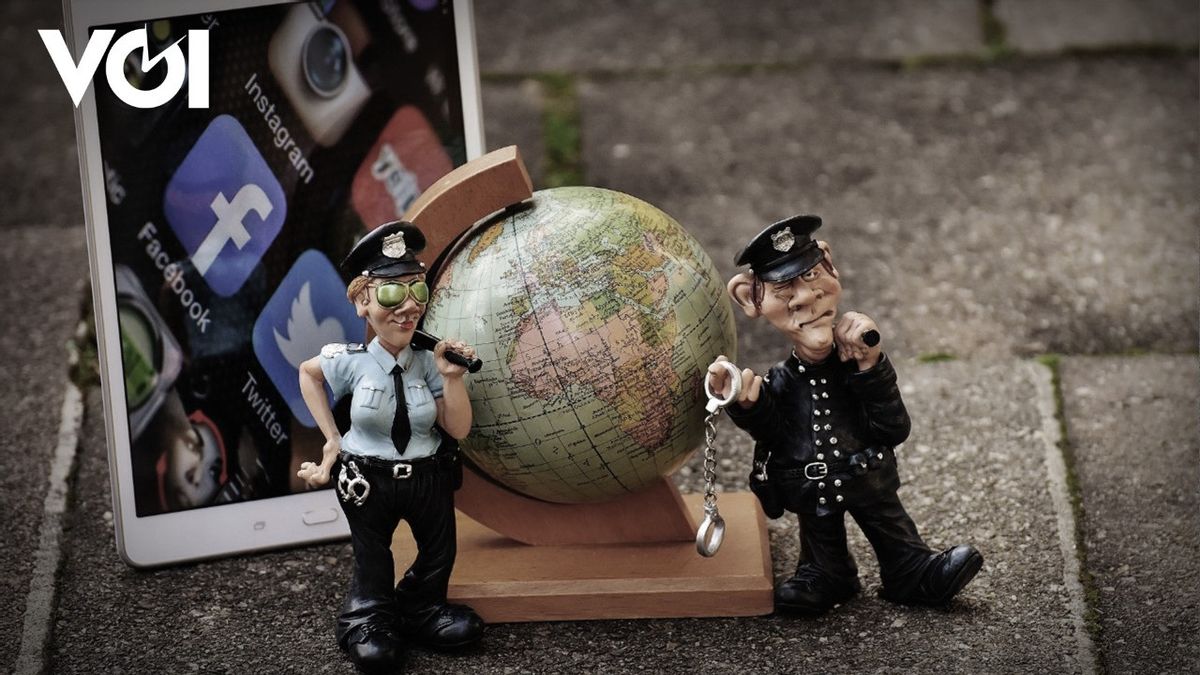Through the article entitled "How Social Media Takes Away Our Happiness", we discussed how the addiction of social media not only impacts personally but also socially. The proof is, Indonesian netizens are listed as one of the most disrespectful based on a Microsoft survey. Just a few days before the survey was released, the National Police officially imposed a Virtual Police patrol to curb netizens on social media. The question, is the Virtual Police effective in addressing social ethics problems, or is it actually increasing the problem? Read more in VOI's Series Article, "The Two-Edged Sword of Social Media".
The characteristic of friendly Indonesian society was suddenly disturbed by a survey conducted by Microsoft some time ago. In a ranking system that lists 32 countries, Indonesia is one of the countries whose citizens are the most disrespectful of online interactions.
Broadly speaking, Indonesia is ranked 29th out of 32 countries listed in the survey. Indonesia is only superior to Mexico (DCI 76), Russia (DCI 80), and South Africa (DCI 81) in terms of politeness in cyberspace.
Indonesia is considered impolite because of the high activity of citizens in terms of exposure to negative things. There are three risk indicators presented by Microsoft in their assessment, namely hoaxes and scams (increased by 13 points), hate speech (increased by five points), and discrimination (decreased by two points).
Exactly a few days before the survey was released, the National Police officially held a Virtual Police. This is a kind of virtual patrol to monitor netizens to prevent cases of violations of the Information and Electronic Transactions Law (UU ITE).
In Virtual Police operations, the National Police claims to prioritize restorative justice. This means that prosecution is the last step in dealing with violations of the Electronic Information and Transactions (ITE) Law. Criminal acts can be resolved by restorative justice.
Three indicators in the Microsoft survey, arguably affirm the problem of the ITE Law regulations that are often violated by Indonesians, including hoaxes and hate speech.
The question is, is the Virtual Police launched by the National Police able to solve the problem of netizens' social media behavior? Or was it just adding to the problem?

A clear line of police duty
Through a virtual discussion with the theme of Virtual Police in the Digital World by Muslim TV, Head of Public Information Bureau (Karo Penmas) of the National Police's Public Relations Division, General Rusdi Hartono, said that the National Police had the aim of preventing crimes on social media such as hate speech, defamation, and fake news.
"The success of the police is not in arresting suspects or obtaining evidence, but in preventing crimes from occurring. People do not become victims or suspects", said Brig. Gen. Rusdi Hartono.
Moreover, reports of crimes related to social media are increasing every year. In 2020, there were 1.794 cases of defamation, 223 reports of hate speech, and 197 cases of fake news. Even the uproar has the potential to cause a commotion that continues in reality.
When contacted by VOI editorial team, a cybersecurity expert from CISSReC Pratama Persadha said the virtual police only served to remind, not a substitute for the function of the judge to determine which one violates the law and who does not. In addition, only accounts that violate the law and crime are given a warning.

"In the end, it is again the people who can see and evaluate the duties of this virtual police", said Pratama.
General Rudi Hartono said that the National Police fully understands freedom of opinion as a human right protected by the constitution. But he said that if someone has participated in social media, it does not mean that person is free from the law. When one content is uploaded in one media, it means that it has entered the public domain, no longer private.
General Rudi said someone who was caught uploading content containing defamation, fake news, or hate speech was given the opportunity to provide clarification regarding the content they uploaded.
"Of course, the discussion room has been prepared when the second direct message is not corrected, they will be given a room for clarification...what is clear is that there is room (for) defense".
No need for a legal approach
Cybersecurity expert from CISSReC Pratama Persadha emphasized that Indonesian people actually need a cultural approach more than a legal approach that often upsets people. Therefore, if the virtual police really prioritizes the principle of restorative justice, then it can provide a sense of comfort to the community.
"The presence of the virtual police is quite capable of reducing hoaxes, hate speech, even cases of defamation, where more and more people are currently policing about the articles of the ITE Law, who report each other using the provisions in the ITE Law", Primary.
"Its presence can simultaneously educate anti-hoaxes in the community. So the impression is that the community is not always threatened but also provided with provisions", he added.
In addition, education is also expected to target the elderly, especially those aged 50 years old and over. This is because these groups easily become targets of hoax content operations. For example, in the family WhatsApp group, where a lot of hoax content is spread by older people.
"Not without reason, because this baby boomer generation is not digital native who does not live and grew up in the transition to digital life. So they must also get attention and education from the state", said Pratama.
Moreover, Pratama explained that currently, people are facing a new life model with work from home (WFH) and distance learning (PJJ). Society is now faced with a fast digitization process. Even though there has been no learning how to surf the internet properly on social media.
"The key to the solution is a healthy internet curriculum that goes to the level of education, so that from an early age, they can be directed when surfing the internet we must be productive, active and positive", explained Pratama.
Because the need for public internet material is needed, the government may be able to focus on creating a good internet usage curriculum. This is because it is more effective in preventing hoaxes and increasing awareness of all levels of Indonesian society.
Follow this edition of Series Article: "The Two-Edged Sword of Social Media"
The English, Chinese, Japanese, Arabic, and French versions are automatically generated by the AI. So there may still be inaccuracies in translating, please always see Indonesian as our main language. (system supported by DigitalSiber.id)












